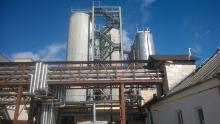John Nurmisen Säätiö
Country: FI
Partner budget: 532.104 EUR
Amount of ERDF funding: 399.078 EUR ERDF

P2 Sustainable use of common resources
2.4. Reduced nutrients, hazardous substances and toxins inflow into the Baltic Sea
Central Baltic
01.03.2020 - 30.11.2022
1.349.412 EUR
1.056.366 EUR ERDF
Biogas is an important renewable energy source for reducing dependency on fossil fuels and tackling climate change. Therefore, biogas production has increased rapidly both in Europe and in the Baltic Sea Region. However, the biogas production is dependent on nutrient-rich organic biomasses and if the production is not managed in a sustainable way, it can be a significant source of nutrients to the environment and the Baltic Sea.
The project will tackle this challenge by 1) developing regulatory and operational practices which take into account and minimise nutrient leakages to watercourses from biogas operations 2) balancing the regional use of digestates and integrating the available information on nutrient flows into regional nutrient maps for decision-making and 3) creating markets for digestates by establishing quality assurance systems and 4) finding feasible solutions for use of sewage-based biomasses. In addition, the project will increase knowledge and awareness of the nutrient management issue in biogas production.
The project activities will focus on Southwest Finland, Latvia’s Zemgale and the Åland Islands. By addressing regional challenges and developing regulatory, economic and voluntary measures for improved nutrient management, the project partners also provide solutions for use on the national and Baltic Sea region levels.
Country: FI
Partner budget: 532.104 EUR
Amount of ERDF funding: 399.078 EUR ERDF
Country: FI
www.ely-keskus.fi/varsinais-suomi
Partner budget: 255.464 EUR
Amount of ERDF funding: 191.598 EUR ERDF
Country: FI
Partner budget: 118.776 EUR
Amount of ERDF funding: 89.082 EUR ERDF
Country: LV
Partner budget: 128.213 EUR
Amount of ERDF funding: 108.981 EUR ERDF
Country: LV
Partner budget: 314.855 EUR
Amount of ERDF funding: 267.626 EUR ERDF
The project has improved the nutrient efficiency of 29 biogas plants as nutrient load sources. The exact reductions have not been measurable as such, but the project has given authorities new information and tools to guide and supervise the biogas plants. Inspection checklists and permitting process have been improved for biogas plants.
Key people from Regional Planning and Environmental and Agricultural ministries have been informed on the need to include biogas industry in the future biomass processing plans, which are currently being made (for household organic waste mostly) in Latvia. Supervision and support authorities have information on best practices for improving environmental risk management and how to support implementation of such practices. The project has suggested to the Ministry of Agriculture and Forestry of Finland that regional nutrient balance (using nutrient maps) and status of the water courses should be used as a criteria for nutrient recycling support scheme for biogas production.
In Latvia, the biogas plants have been informed on high-risk practices and that they should take extra care to minimise them as LSES will supervise them especially closely. In Finland ELY is utilising the project outputs when giving advice to new and existing biogas plants. Some of the recommended good practices also have economic benefits.
The existing Finnish quality assurance scheme will be updated according to the proposal done in the project. This way the scheme will better meet the requirements of the existing legislative framework and make it more useful both for fertiliser producers and users (farmers, food industry). The preparation of Latvian quality assurance scheme proposal provided useful information about similar schemes in Europe and new information to Latvian biogas operators.
International Seminar 11. 22021, Presentation Marjukka Porvari (No 2) Sustainable Biogas
RAVINNEKIERTO RATKAISEE BIOKAASUALAN KOHTALON (2020)
The root cause of eutrophication in the Baltic Sea is addressed through nutrient maps and strategies